
Title: Trump Plans 100% Tariffs on Computer Chips
In a recent move that has sent shockwaves through the global tech industry, US President Donald Trump has announced plans to impose a 100% tariff on computer chips and semiconductors coming into the United States. The tariff, which is expected to take effect soon, will apply to all chips and semiconductors imported into the country, unless companies agree to manufacture them domestically.
According to reports, the tariff rate will not apply to companies that have made a commitment to manufacture computer chips and semiconductors in the US. This move is seen as an attempt by the Trump administration to boost domestic manufacturing and reduce reliance on foreign imports.
The US has been struggling to revive its manufacturing sector, and the move is seen as a way to create jobs and stimulate economic growth. However, experts warn that the tariff could have far-reaching consequences for the global tech industry, including increased costs for consumers and potentially devastating impacts on global supply chains.
The US last year produced about 12% of semiconductor chips globally, down from 40% in 1990. The decline of the US semiconductor industry has been attributed to a combination of factors, including increased competition from Asian manufacturers and a lack of investment in domestic manufacturing.
The tariff is expected to take effect soon, but the exact date has not been announced. The move has been met with widespread criticism from tech industry leaders and experts, who warn that it could lead to a trade war and damage global economic growth.
The tariff could also have significant implications for the global supply chain, particularly for companies that rely heavily on imported chips and semiconductors. Many tech companies, including major players like Apple and Intel, rely on foreign manufacturers to produce a significant portion of their components.
The tariff could also lead to a surge in domestic manufacturing, as companies look to establish their own chip-making facilities in the US. This could create new job opportunities and stimulate economic growth, but it could also take time and require significant investment.
The move is also seen as a way to pressure Asian manufacturers, particularly those in China, to agree to US demands on trade. The Trump administration has been pushing for China to agree to a range of trade concessions, including increased access to the Chinese market and reduced trade barriers.
The tariff is not the first move by the Trump administration to target the tech industry. Earlier this year, the administration imposed tariffs on a range of Chinese-made goods, including laptops and tablets. The move was seen as a way to pressure China to agree to trade concessions.
The tech industry has been one of the fastest-growing sectors of the US economy, and the tariff could have significant implications for companies that rely on imported components. Many tech companies, including major players like Amazon and Microsoft, have been vocal in their opposition to the tariff.
In a statement, the Semiconductor Industry Association (SIA) warned that the tariff would “harm US companies and consumers” and “undermine the competitiveness of the US semiconductor industry.” The SIA also warned that the tariff could lead to a trade war and damage global economic growth.
The move is also seen as a blow to the global economy, which has been struggling to recover from the effects of the COVID-19 pandemic. The pandemic has led to widespread lockdowns and border closures, and many countries are still struggling to recover from the economic damage.
The tariff is not the first move by the Trump administration to target the tech industry. Earlier this year, the administration imposed tariffs on a range of Chinese-made goods, including laptops and tablets. The move was seen as a way to pressure China to agree to trade concessions.
The tech industry has been one of the fastest-growing sectors of the US economy, and the tariff could have significant implications for companies that rely on imported components. Many tech companies, including major players like Amazon and Microsoft, have been vocal in their opposition to the tariff.
The move is also seen as a way to pressure Asian manufacturers, particularly those in China, to agree to US demands on trade. The Trump administration has been pushing for China to agree to a range of trade concessions, including increased access to the Chinese market and reduced trade barriers.
The tariff is not a new concept for the Trump administration. Earlier this year, the administration imposed tariffs on a range of Chinese-made goods, including laptops and tablets. The move was seen as a way to pressure China to agree to trade concessions.
In conclusion, the move by President Trump to impose a 100% tariff on computer chips and semiconductors coming into the United States is a significant development for the global tech industry. While the move is seen as a way to boost domestic manufacturing and create jobs, it could also have far-reaching consequences for the global economy and potentially devastating impacts on global supply chains.
The tariff is expected to take effect soon, and companies that rely on imported components are likely to feel the impact. The move is also seen as a way to pressure Asian manufacturers, particularly those in China, to agree to US demands on trade.
The tech industry has been one of the fastest-growing sectors of the US economy, and the tariff could have significant implications for companies that rely on imported components. Many tech companies, including major players like Amazon and Microsoft, have been vocal in their opposition to the tariff.
The move is a significant development for the global tech industry, and it will be interesting to see how it plays out in the coming months.



